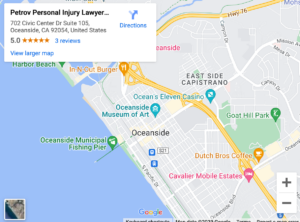
When Party A’s misconduct injures Party B, a personal injury claim arises in favor of Party B. That means Party B can file a claim against Party A for monetary damages. Loss of consortium is a form of non-economic damages that arises, if at all, in favor of “Party C” – Party B’s spouse or registered domestic partner. Only Party C can assert this claim.
Definition

California defines loss of consortium to include the loss of love, companionship, comfort, care, and many others. The meaning of loss of consortium is broad enough to include loss of sexual relations due to a personal injury as well.
The Legal Elements of a Loss of Consortium Claim
A legal element is a fact you have to prove to win your claim. You must prove each of the following four legal elements by a “preponderance of the evidence.” All this means is that your evidence must outweigh the opposing party’s evidence, even if only by a bit. To win a loss of consortium claim, you must prove that:
- Your spouse or domestic partner suffered a physical injury due to someone else’s negligence or other misconduct. This is exactly what your partner has to prove to win their own personal injury claim.
- Your and the injury victim were spouses or registered domestic partners at the time of the injury.
- You suffered a loss of your spouse or domestic partner’s consortium, as defined above.
- The injury was the proximate cause of your loss of consortium.
For the sake of brevity, hereinafter, this article will refer to “spouse or domestic partner” as “partner.”
Damages
You can demand the following types of damages in a loss of consortium claim:
- Pain and suffering,
- Inconvenience,
- Mental anguish,
- Emotional distress,
- Loss of society,
- Loss of companionship,
- Injury to your reputation, and
- Humiliation.
The opposing party in negotiations (likely an insurance company) will probably try to downplay these losses because they are “subjective.” Don’t fall for it – non-economic damages are often worth more than tangible economic damages such as medical expenses.
The Magnitude of Your Claim
The magnitude of your loss of consortium claim depends on:
- The extent to which your partner’s injury affected you.
- Your age and your partner’s age. The magnitude of your claim is proportional to the estimated number of years remaining in your relationship.
- The chances that your partner will recover. This factor also relates to the estimated length of time that you will suffer a loss of consortium.
The opposing party is likely to strongly prefer to settle the claim out of court because juries are unpredictable.
Defenses Against Loss of Consortium Claims
Following is a list of five of the most common defenses against loss of consortium claims.
- Your partner has no valid personal injury claim. This defense will work if your partner loses their own claim.
- Contributory fault. If your partner was 30% at fault for the accident, for example, the court will deduct 30% from your damages.
- Relationship discord: The opposing party might claim that your relationship was failing before the accident. If so, the accident might not have been the cause of your loss of consortium.
- You and your partner were not in a valid marriage or domestic partnership at the time of the accident. You cannot marry an injured person and then file a claim for loss of consortium. If you are domestic partners, you must have registered your partnership with the appropriate state agency, and if you are spouses, a “common law” marriage will not suffice
- Your partner’s injuries were not serious enough to justify your claim.
These are not the only possible defenses—other defenses might arise depending on the facts of your case.
Beware: You Will Have To Answer Embarrassing Questions
Many people find it difficult to pursue a loss of consortium claim, especially at trial. The opposing party’s lawyer will certainly ask you some embarrassing questions that could make you very uncomfortable. Below is a sampling:
- How often did you and your partner argue before the accident? What were the arguments about?
- How often do you and your partner argue now? What do you argue about?
- Is your partner able to perform sexually?
- How often did you and your partner have sex before the accident?
- How often do you and your partner have sex at present?
- Have you ever cheated on your partner?
- To the best of your knowledge, has your partner ever been unfaithful to you?
The opposing party might ask you these questions during settlement negotiations to deter you from filing a lawsuit.
Talk to a Vista Personal Injury Attorney
If you believe you might have a loss of consortium claim, contact an experienced Vista personal injury lawyer. Although these claims can be difficult to win, many people have won them. The better your legal representation, the more money you are likely to win.
Contact or call Petrov Personal Injury Lawyers at (619) 344-0360 to schedule a free consultation with one of our experienced personal injury attorneys in Vista, CA.


